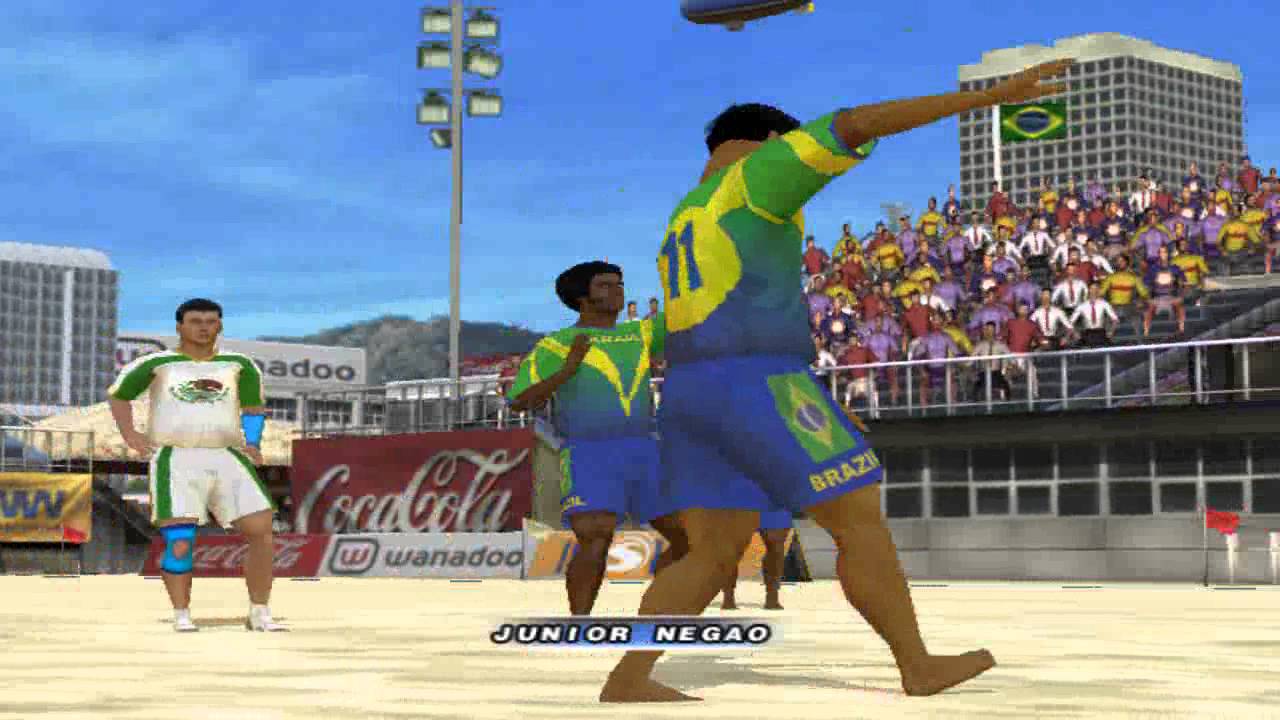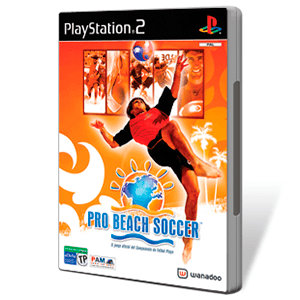Game: Pro Beach Soccer (PS2)
Release Date: April 2003
Having it all and wasting it away
In a perfect world, a game that combines football, hot girls dancing with little clothing in a beach scenery should never get anything less than a 10 out of 10.
Yet, Pro Beach Soccer manages to miss the opportunity to become an instant classic among the football/women/beach-loving audience – and it’s fair to say their target market is far from tiny. While it was the first – and last – console video-game fully-dedicated to beach soccer, ultimately that didn’t help PBS’s effort to become relevant in the sports gaming world.
And here lies definitely the greatest asset of this game: it’s the only beach soccer videogame out there; and though the sport’s popularity is in no way comparable to that enjoyed by the original version of it, it’s still something to rely upon if you want to create a good impression on gamers desperately looking out for something different.
The game offers a decent number of competitions and game modes to keep the player hooked, particularly Arcade Mode and Pro Beach Soccer Tour, the latter being the closest to a long-term career mode – a pivotal feature on any solid sports game – in which you’re able to play 3 seasons of international football, earning points to stay on top of the world rankings. It’s fair to say that PBS provides a decent platform of content to keep the user hooked, even if many football games of its era provide more depth.
No beach soccer fan truly expected club teams to make it into the game, as National Teams were far more popular at the time. They didn’t, and you’re given a pretty decent number of NTs to work with. I was honestly expecting to see only the best national squads of the world included, but even some obscure beach soccer NTs are present. The players all have their correct names but the team’s kits are not 100% lifelike; each team has two kit versions to choose from: either a more realistic one, copying the real-life’s kit colors, or a fantasy one that allows you to wear a quite stylish implementation of the country’s flag – which will basically make the players wear the U.K. flag if England is playing, for example. A nice little touch that reminds us that lack of licensing is a great opportunity to get creative and try something new.
You get to choose from a few different venues, from Bangkok to Rio de Janeiro, and the match commentary will vary according to where the matchup is being played: you’ll hear brazilian commentary on Rio de Janeiro, french on Marseille, and an american accent on Venice Beach’s English commentary. More on that later, but it’s certainly an unexpected addition.
Someday I will be as cool as this guy is.
Before the actual match is to be played, one’s able to begin his process of understanding why this game was far from a success. Here you have a unique platform, there’s no other beach soccer game out there…time to make the most out of your resources, right? Well, no. The tactics screen is absolutely bare-boned and basic; besides choosing the players to fit a preset, unchangeable formation, you aren’t able to do anything else. It’s an opportunity that was lost to introduce more depth to the experience, maybe allowing the user to define formations, player runs, defensive settings, and strategic commands that were already present on the PES series at the time – which was, undoubtedly, the undisputed king of football gaming, one definitely worthy of being emulated on what it does best.
As the match kicks off, it’s painfully clear that the gameplay has some serious limitations. The AI is not clever at all when defending or providing passing lanes, though it’s often challenging when creating chances to score. The ball physics are quite impressive, particularly considering the fact it’s supposed to portray a sport played on sand, and you’ll definitely see the ball slowing down or even stop altogether when contacting the ground – giving a very realistic feel to the experience. However, the game didn’t take advantage of that to create a more unpredictable game of beach soccer; passing and shooting feels awkwardly limited to the point where you’ll often see shots going to the same exact spot, displaying a disappointing lack of variance.
Winning or losing in PBS is much more a matter of luck and exploiting cynically the shortcomings of its gameplay, rather than a matter of skill. Once you get accustomed to its typical AI behaviors, your chances of being successful in this game dramatically increase. There’s little else to keep you guessing; the lack of animations and the predictable AI is an immersion-killer.
In all honesty, PBS isn’t trying to be a realistic game anyway. On the top of the screen, both teams have their own skill point meters; fill it up with points awarded after shots or tricks and after the meter is full…behold, one of the most awkwardly funny cutscenes in football gaming history: the match stops, and a blue light comes down from the skies to embrace every player on the team. Sometimes, you’ll see them dropping down on their knees, looking up, and achieving this football nirvana; but my favourite is when the players start dancing in a circle, as the blue light embraces a group of individuals gaily showcasing their moves. PBS is worth playing for this sight alone.
Sand...sand in my eyes...sand everywhere!
As mentioned previously, the match commentary will vary according to the location, but again, while the idea was interesting, the outcome is disappointing as there are just a few lines of commentary that you’ll ever hear. It fails to bring about a somewhat believable atmosphere to the match; however, the shortage of lines actually contribute to make the available few become unforgettable. For years I’ve had “On ne passe pas!” and “Que defesa do goleiro!” stuck in my head, at least the delivery of those lines was exciting enough to make an impression.
The graphics are not that bad, it’s not that far from what games such as PES or FIFA offered at the time. Details such as seeing the sand lifting up a bit when for example a player lifts the ball, or when shooting; the dancers on the sidelines, overall it creates a visual experience that is far from an eye-sore. However, for a title that claims to be the official game of beach soccer, it’s completely unforgivable to see even the most legendary of players such as Portugal’s Madjer with absolutely inaccurate appearances – to the point where it feels like the replication of these players was a completely randomized process. Football games in 2003 were far from the levels of visual realism in player faces that they would achieve in just a couple of years later, but still, a good number of those games had at least a group of recognizable individuals, particularly and naturally the most popular and important of the sport. On PBS, even the best are impossible to recognize, unless you go by their licensed names.
The Good
- It’s the only Beach Soccer game on the market
- Includes many national teams and all players have correct names
- Arcade-driven fun
The Meh
- No career mode, relies on Arcade Mode and PBS Tour to generate longevity
The Ugly
- The gameplay is sub-par, fails to create an engaging experience
- Poor commentary
- Horrible player likenesses
Score: 5/10
For all its (few) quirks and upsides, Pro Beach Soccer is a modest experience with little value. Its main strength is the fact that it’s the only beach soccer game ever released, but its disappointing gameplay hurts the experience profoundly. It’s worth for the novelty factor, though it won’t take long for anyone to be overwhelmed with its glaring flaws. Still, should you fancy a change from the dominant retro-football games of the early days of the PlayStation2/Xbox era, or if you’re just looking for an explosive arcade-driven sports experience to relax and have a good time with, give PBS a try…and maybe you’ll achieve beach soccer nirvana one of these days – beware of the blue light though!


